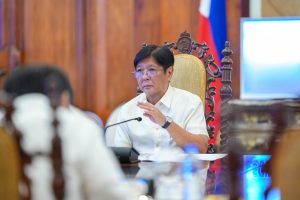In the Philippines, the Duterte and Marcos political dynasties and their supporters are busy throwing mud at each other over who should be held accountable for the drug menace.
In the Senate, former police chief Ronald “Bato” dela Rosa delivered a speech challenging his colleagues to support him and the Dutertes. “I would like to ask the members of this august body,” he said. “Where do you stand in protecting our citizens?”
His speech was a reaction to news reports about the apparent shift in the position of President Ferdinand “Bongbong” Marcos Jr.’s administration with regard to the ongoing investigation of the International Criminal Court (ICC) into the role of former President Rodrigo Duterte and several police generals in the brutal enforcement of the anti-drug campaign during their term in office.
Dela Rosa was furious that two high-ranking officials of the Marcos government had given assurances that ICC personnel would not be prevented from fulfilling their work in the country.
Asked about the plan of the ICC to send a team to the Philippines, Solicitor General Menardo Guevarra said that the government was aware of the request. “We cannot stop the ICC prosecutor from investigating. That’s his mandate. He can interview anyone by phone, by email, through local organizations, even face-to-face if the subject consents to be interviewed,” he told reporters.
Justice Secretary Jesus Crispin Remulla made a similar assertion and even added that the government cannot stop Interpol if it seeks to carry out a lawful arrest in the country. “We are not in the business of blocking any movement of the Interpol unless a policy is laid out, which of course will go against our international commitments,” he said in a media interview.
For Dela Rosa, the statements of Guevarra and Remulla contradicted the earlier pronouncements of President Marcos, who repeatedly insisted that the Philippines would not cooperate with the ICC probe because of jurisdiction and sovereignty concerns. Dela Rosa warned that authorities may be liable for the crime of illegal detention or serious illegal detention if they make an arrest based on an ICC request.
If there was a policy change, it is a likely reflection of the widening rift between the Dutertes and Marcoses. The feud has become more vicious this year with Duterte accusing Marcos of being a drug addict. Marcos has denied the charge and retorted that the former president is under the influence of fentanyl. Duterte’s son has recently filed a bill in Congress requiring all officials to undergo drug testing.
Meanwhile, allies of Marcos have started a series of Congressional hearings about the proliferation of drugs, criminal activities associated with Philippine offshore gaming operators, and extra-judicial killings. Legislators said the hearings will “help in the prosecution and conviction of the perpetrators, conspirators and masterminds of the whole criminal network.” They added that the probe is part of “the journey of ferreting the truth, seeking justice, and healing of our people.”
One of the witnesses they presented was a former Customs official who implicated Duterte’s son, son-in-law, and his former economic adviser in a case relating to a shipment of illegal drugs. The son-in-law is the husband of Vice President Sara Duterte, who resigned from her post as education secretary in July and has assumed the role of a critic of the Marcos administration.
Unlike her father, Sara Duterte has not directly accused Marcos of using illegal drugs. But she issued a statement declaring that “leaders should not be motivated by cash, cocaine, or champagne.” She also supported the bill of her brother and has accepted the challenge to undergo drug testing.
As politicians engage in partisan bickering, victims of the bloody “war on drugs” continue to clamor for justice. The intensifying rivalry ahead of the 2025 midterm election should not drown out the calls for truth, accountability, and justice.

































